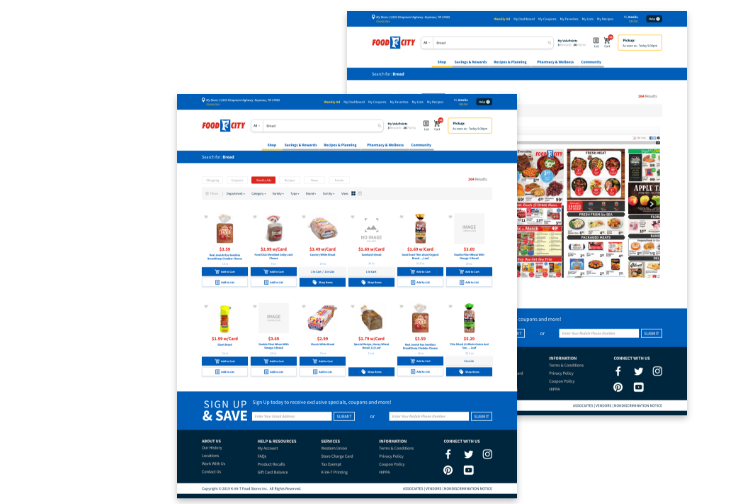
Wellness Club — Colorectal Health Month
Abingdon, VA. -
Friday, Mar 1, 2024.
Written by: Rebecca Webb, PharmD, Pharmacy Clinical Services Manager
When you think of March, certain ideas come to mind: the arrival of spring, St. Patrick’s Day, and maybe even March Madness. However, March is also an important month to focus on colorectal health. Colorectal is a term referring to the colon and rectum of the large intestines (i.e., large bowel). Sometimes, the term “colon” is used to describe the entire large intestines. This is the area of the digestive system where food waste is formed and eliminated. Since this is a necessary process for the body, it is imperative to keep it healthy and functioning properly. Some colorectal health conditions can be resolved with lifestyle modifications or medications. Others must be addressed by a doctor. This March, take the time to learn about colorectal issues and make digestive health a priority.
Constipation
• The number of bowel movements differs from person to person. Constipation may be a temporary condition, or it may last longer in some individuals. In general, constipation is defined as having less than three bowel movements a week, stools that are difficult/painful to pass, or incomplete emptying of stool.
• There are numerous factors that can contribute to constipation, such as inadequate liquid intake, lack of fiber in a diet, not enough physical activity, medication side effects, or there could be a more serious underlying condition. Medications that can potentially cause constipation include opioid pain medications, calcium or aluminum antacids, iron supplements, antihistamines for allergies (e.g., diphenhydramine, Benadryl®), calcium channel blockers for high blood pressure/heart conditions (e.g. verapamil, diltiazem), anticholinergics for urinary incontinence (e.g., oxybutynin), non-steroidal anti-inflammatory drugs (e.g., ibuprofen, Advil®), and certain antidepressants. If you are experiencing chronic constipation, speak with your Food City Pharmacist to see if any of your medications could potentially be contributing to your condition. Your doctor may need to make adjustments to your medication regimen.
• Constipation can sometimes be resolved with lifestyle changes (e.g., eating a well-balanced diet with adequate fiber, drinking plenty of water, routine exercise). Over-the-counter (i.e., OTC or nonprescription) laxatives may also help with bouts of constipation. However, not all laxatives are safe for long-term use. It is important to read the package label carefully and always use them as directed. Different types of nonprescription laxatives include:
o Osmotics, which pull water into the colon to ease the passage of stool (e.g., polyethylene glycol, Miralax®, or TopCare® health ClearLax®).
o Bulk-forming, which absorb water to form bulky stool and prompt intestinal muscle contractions (e.g., Metamucil®, TopCare® health Fiber Powder, Benefiber®, TopCare health™ Total Fiber).
o Stool softeners, which add moisture to soften stool (e.g., docusate sodium, Colace®, TopCare® health Stool Softener).
o Stimulants, which trigger intestinal muscles to eliminate stool (e.g., bisacodyl, Dulcolax® Laxative, TopCare® health Gentle Laxative, senna/sennosides, Senokot®, TopCare® health Vegetable Laxative).
o Rectal suppositories, which also trigger intestinal muscle contractions and soften stool (e.g., Dulcolax® Medicated Laxative Suppository)
• Food City Pharmacists can help you decide and choose if OTC laxatives are appropriate. Prescription medications are also available for constipation if both lifestyle changes and OTC products are ineffective. Sometimes, constipation issues must be addressed with your primary care provider, especially if an underlying condition is suspected. It is important to contact your doctor if you are experiencing constipation along with severe cramping or pain, bloody stools, rectal bleeding, long-term symptoms despite laxative use, unusual fatigue, dizziness, or unexplained changes in bowel habits.
Diarrhea
• An individual may experience an episode of diarrhea every now and then, or diarrhea may become a recurrent issue. Chronic diarrhea is defined as having at least three daily loose stools for more than four weeks. Chronic diarrhea can potentially lead to dehydration or malnutrition.
• Conditions and factors that can cause diarrhea include viral/bacterial/parasitic infections, certain medications (e.g., metformin for diabetes, antibiotics such as amoxicillin or cefdinir), dietary choices (e.g., artificial sweeteners), lactose intolerance, and chronic digestive disorders (e.g., irritable bowel syndrome, Crohn’s disease, ulcerative colitis, celiac disease).
• There are several OTC medications that can help for episodes of diarrhea.
o Loperamide (e.g., Imodium® A-D, TopCare® health Anti-Diarrheal) works by making intestinal muscles contract more slowly.
o Bismuth subsalicylate (e.g., Pepto-Bismol®, TopCare® health Stomach Relief) can also help with diarrhea.
o As with all nonprescription medications, make sure to read the package label carefully and always use them as directed.
• Food City Pharmacists can help you decide and choose if an OTC anti-diarrheal is appropriate. However, there could be a more serious underlying condition going on in a patient experiencing diarrhea. Contact your doctor if the diarrhea persists or you are also experiencing severe gastrointestinal pain, atypical bowl behavior, fever, blood in stool, rectal bleeding, unusual fatigue, or severe dehydration.
Colorectal Cancer
• National Colorectal Cancer Awareness Month is observed in March and is meant to focus on the prevention and early detection of colorectal cancer (i.e., colon cancer). Colorectal cancer is the third most common cancer in men and women in the United States. It is also the second leading cause of cancer deaths.
• Colorectal cancer is a disease where cells in the colon or rectum multiply out of control. These abnormal growths are called polyps and may develop into cancer over time if not removed.
• Colorectal cancer does not always have symptoms. However, symptoms may include gastrointestinal cramping or pain, bloody stool, unusual change in bowel habits, constipation, diarrhea, or unexplained weight loss.
• Screening (e.g. colonoscopy) is absolutely paramount with colorectal cancer. It involves looking for precancerous polyps so they can be removed before they turn into cancer. Screening also helps to find colorectal cancer early. Screening is recommended at regular intervals for adults 45 to 75 years of age. For individuals with certain risk factors, it may be recommended to screen earlier than 45 years of age or screen more often. It is also advised that adults 76 to 85 years of age should speak with their doctor about getting screened.
• It is still not certain what causes colorectal cancer. Risk factors for colorectal cancer may include having a personal or family history of colorectal cancer or colorectal polyps, increased age, being overweight or obese, having inflammatory bowel disease (e.g., ulcerative colitis or Crohn’s disease), having type 2 diabetes, insufficient exercise, having an unhealthy diet low in fiber and high in fats, drinking alcohol, and tobacco use.
Stop by your Food City Pharmacy in March and speak with your pharmacist about colorectal health. Our pharmacists want to share their knowledge on medications and preventative health to help you live your best life.
References:
1. Colorectal Cancer. American Cancer Society website. Colorectal Cancer Information | Understanding Colorectal Cancer | American Cancer Society. Accessed February 15, 2024.
2. Colorectal Cancer Quiz. Centers for Disease Control and Prevention Website. https://www.cdc.gov/cancer/colorectal/quiz/index.htm. Accessed February 15, 2024.
3. Constipation. Mayo Clinic website. Constipation - Symptoms and causes - Mayo Clinic. Accessed February 15, 2024.
4. Diarrhea. Mayo Clinic website. Diarrhea - Symptoms and causes - Mayo Clinic. Accessed February 15, 2024.












